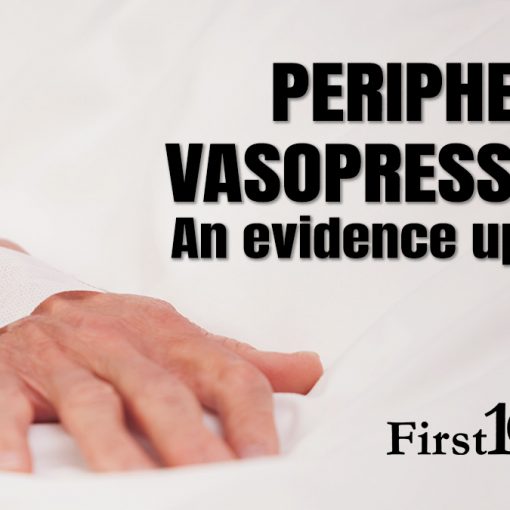ECMO is an exciting technology. It gives us the sense that we may be able to overcome the limitations of medicine; that one day we will truly be able to cheat death. However, if the history of medicine is any guide, there are no miracle cures. ECMO is exciting enough that I have discussed it in a number of resuscitation posts (such as the management of electrical storm, management of pulmonary hypertension and right heart failure, and management of calcium channel overdose). However, it is important to acknowledge the paucity of evidence for this intervention. For years we have heard about the tantalizing possibility of using ECMO for cardiac arrest. In fact, many centers already have ECMO-CPR programs. To date, the evidence has been limited to observational studies in very select populations, although the results have been promising. (Wang 2017; Dennis 2017; Dennis 2020) The ARREST trial is the first randomized trial of ECMO CPR in out of hospital cardiac arrest.
The paper
The ARREST trial Yannopoulos D, Bartos J, Raveendran G, Walser E, et al. Advanced reperfusion strategies for patients with out-of-hospital cardiac arrest and refractory ventricular fibrillation (ARREST): a phase 2, single centre, open-label, randomised controlled trial. Lancet. 2020 Nov 12:S0140-6736(20)32338-2. doi: 10.1016/S0140-6736(20)32338-2. Epub ahead of print. PMID: 33197396 NCT03880565
The Methods
The ARREST trial was a phase 2, single-center, open-label, pragmatic, randomized clinical trial.
Patients
Adult patients (aged 18-75) with out of hospital cardiac arrest, an initial rhythm of ventricular fibrillation or ventricular tachycardia, no return of spontaneous circulation (ROSC) after three defibrillations, a body size that fit the Lund CPR Assist system, and an estimated transfer time to the emergency department of less than 30 minutes.
- Exclusions: DNR orders, trauma or burns, drowning, overdose, pregnancy, nursing home resident, unavailability of the cath lab, contraindications to angiography, contract allergy, and active GI or internal bleeding.
Intervention
ECMO (veno-arterial extracorporeal membrane oxygenation)
- Patients were brought straight to the cath lab by EMS and placed on ECMO.
- There were strict criteria used to discontinue resuscitation in this group (two or more of the following: end-tidal CO2 <10 mm Hg, PaO2 <50 mm Hg or oxygen saturation <85%, and lactic acid >18 mmol/L).
Comparison
Standard ALS.
- The protocol dictated that resuscitation efforts had to continue for at least 15 minutes after ED arrival and at least 60 minutes after the 911 call.
Outcome
The primary outcome was survival to hospital discharge.
The Results
They included 30 patients, with a mean age of 59 years, 83% of whom were men.
The results were pretty dramatic. There was a large improvement in the primary outcome of survival to hospital discharge (43% versus 7%, ARR 36%, 95% CI 3.7-59.2%). Survival to 3 and 6 months was also better in the ECMO CPR group (43% vs 0%, p=0.006).
My thoughts
This is a much needed trial. It was a well designed trial, but there are obvious limitations given that this was a very small single-center open-label phase 2 trial.
In an open label trial, I think we need to be concerned about the significant technological optimism bias that could be at play. We are all pretty pessimistic about outcomes in out of hospital cardiac arrest. Refractory ventricular fibrillation certainly gets our attention, but we are still apt to be pessimistic about the outcomes, and that pessimism can translate directly into outcomes, as we decide how long to run the resuscitation. On the other hand, ECMO is exciting, and by definition the code is not going to be called early. The dramatic results seen here could be the result of a self-fulfilling prophecy – we give up on the patients getting ALS earlier, and therefore they die more. That being said, I can’t think of a good way to blind the treatments to remove the possibility of such a bias.
Another difference between the groups in this trial is that ECMO was performed in the cath lab and so every patient in the group received an immediate angiogram. In the standard care arm, transfer to the cath lab was only done if ROSC was obtained and the cath was warranted by clinical protocol. 13 patients in the ECMO CPR arm underwent angiography as compared to only 2 in the ALS treatment group, which could definitely influence outcomes. That being said, one of the major advantages of ECMO CPR might be keeping the patient alive long enough to get an PCI performed, because we definitely can’t bring people to the cath lab while running a standard ALS code.
The exclusion criteria are relatively long, as would be expected in a study like this, but not as strict as those used in some ECMO centers. The only exclusion that makes me concerned for potential bias is the ‘unavailability of the cath lab’. That is a practical exclusion, and it makes perfect sense, but it also allows for a second assessment of the patient after randomization where other prognostic features could factor into the decision of whether the cath lab is really available. (You might bump a patient and make the cath lab available for a 35 year old, while deciding it is truly unavailable if the ECMO candidate is 74.)
The small numbers mean that there are numerous baseline differences between the groups. One that caught my eye was that there were far fewer women in the ECMO arm of the trial. There is lots of previous research that women have worse outcomes after cardiac arrest, and also that they are made DNR more often if ROSC is obtained. There are so many ways that data can be biased when the dataset comprises only 15 patients per group that larger trials are clearly needed before we are convinced of a benefit.
We generally care most about survival with good neurologic outcomes. I am glad they followed these patients out to 6 months, and hopefully follow-up studies will make this their primary outcome. There were many patients in the ECMO group who were unable to walk at the time of discharge, but the authors believe that was primarily due to prolonged hospitalization and decondiation, because the neurologic scores improved with time, and at 6 months all of the survivors had good functional assessment scores.
Bottom line
This is a promising early study of ECMO in the management of out of hospital cardiac arrest with a shockable rhythm. That being said, this is a small study with many potential sources of bias. Larger studies will be needed to confirm the dramatic benefits seen here.
Other FOAMed
References
Dennis M, McCanny P, D’Souza M, Forrest P, Burns B, Lowe DA, Gattas D, Scott S, Bannon P, Granger E, Pye R, Totaro R; Sydney ECMO Research Interest Group. Extracorporeal cardiopulmonary resuscitation for refractory cardiac arrest: A multicentre experience. Int J Cardiol. 2017 Mar 15;231:131-136. doi:10.1016/j.ijcard.2016.12.003. Epub 2016 Dec 6. PubMed PMID: 27986281
Dennis M, Buscher H, Gattas D, Burns B, Habig K, Bannon P, Patel S, Buhr H, Reynolds C, Scott S, Nair P, Hayman J, Granger E, Lovett R, Forrest P, Coles J, Lowe DA; Sydney ECMO Research Interest Group. Prospective observational study of mechanical cardiopulmonary resuscitation, extracorporeal membrane oxygenation and early reperfusion for refractory cardiac arrest in Sydney: the 2CHEER study. Crit Care Resusc. 2020 Mar;22(1):26-34. PMID: 32102640
Wang GN, Chen XF, Qiao L, Mei Y, Lv JR, Huang XH, Shen B, Zhang JS. Comparison of extracorporeal and conventional cardiopulmonary resuscitation: A meta-analysis of 2 260 patients with cardiac arrest. World J Emerg Med. 2017;8(1):5-11. Doi: 10.5847/wjem.j.1920-8642.2017.01.001. PubMed PMID: 28123613
Yannopoulos D, Bartos J, Raveendran G, Walser E, et al. Advanced reperfusion strategies for patients with out-of-hospital cardiac arrest and refractory ventricular fibrillation (ARREST): a phase 2, single centre, open-label, randomised controlled trial. Lancet. 2020 Nov 12:S0140-6736(20)32338-2. doi: 10.1016/S0140-6736(20)32338-2. Epub ahead of print. PMID: 33197396
Morgenstern, J. The ARREST trial – ECMO CPR, First10EM, December 14, 2020. Available at:
https://doi.org/10.51684/FIRS.52440






3 thoughts on “The ARREST trial – ECMO CPR”